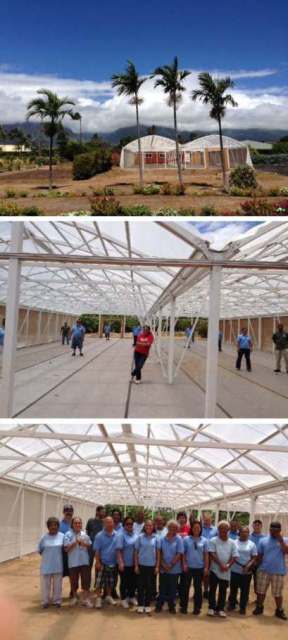Hawaii Aquaponics Workforce Development: Growing Diversity in Hiring and Employment (HI UCEDD)
September 23, 2013

|
The Center on Disability at the University of Hawaii is supporting Hawaii's revitalization investment plan to support the growing diverse small farm movement, and to fulfill the federal mandate to include disability in diversity hiring and employment. The Hawaii Aquaponics Workforce Development Project on Maui (referred to UH AQ) is model pilot training adults with mental illness and other disabilities including intellectual and developmental disabilities in the sustainable food production method of aquaponics - growing fish and plants together in a single system without soil using recirculating water. Trainees are working towards an industry recognized certification as Aquaponic Technicians. Trainees are participating in the development of a 5,000 square foot greenhouse that will soon be home to a commercial-scale aquaponic demonstration system. They will have the opportunity to work and further their training in the completed greenhouse.
Of the 22 trainees, 100% live below the federal poverty level and are had been unable to afford post-secondary technical education; 98% access mental health services; 5% have intellectual disabilities; and, 20% are connected with judiciary system. Currently, all 22 trainees are eligible to receive a training stipends, which are approved by the Social Security Administration (SSA). HI AQ offers an evidence-based participatory action, mental health recovery model and is showing promise as a competitive and sustainable food production and workforce development incubator. A success of the program has been the launch of a disability owned and operated Maui Aquaponics Workers Cooperative, a supported, customized self-employment initiative starting with a core cadre of trainees who will soon be providing their services to the community in aquaponic equipment sales, education and technical assistance.
UH AQ is Hawaii's first commercial aquaponics certification program and has invested more than $200,000 in the UH Maui College Kahului campus infrastructure. The greenhouse is an accessible and sustainable state-of-the-art facility, with electric input aligned with a photovoltaic system. Training uses Universal Design for Learning (UDL) and includes mental health recovery and supported employment best practices. This model promotes inclusion and supports the transition of adults and youth with disabilities. Experimental courses will be offered in Spring 2014, which will lead to community college credit and non-credit certifications.
The UH AQ Greenhouse uses 90% less water than traditional tropical agricultural farming and demonstrates a model of affordability and contributes to food sustainability on Maui. This model creates technical job opportunities for certified trainees and aligns with the statewide diverse crop small farm movement.
UH AQ is leveraged in the Maui community and building partnership between the UH Maui College, Food Innovation Center and Maui College New Farmer Institute; DOE School Garden program; DOE/UH CTE Natural Resources Production pathway; the Department of Vocational Rehabilitation, College of Tropical Agriculture and Human Resources (CTAHR-Maui); and the College of Education, University of Hawaii Manoa. The Department of Labor Green Jobs Grant also funded the first year of the program, with support from Sustainable Living Institute of Maui and Maui College Edventure Continuing Education. UH AQ is currently working on collaborating with the Hawaii Department of Education (DoE) youth in transition and dual enrollment efforts to prepare students with diverse abilities for competitive and meaningful employment, among other initiatives.
For additional information please contact Susan Miller, [email protected].







